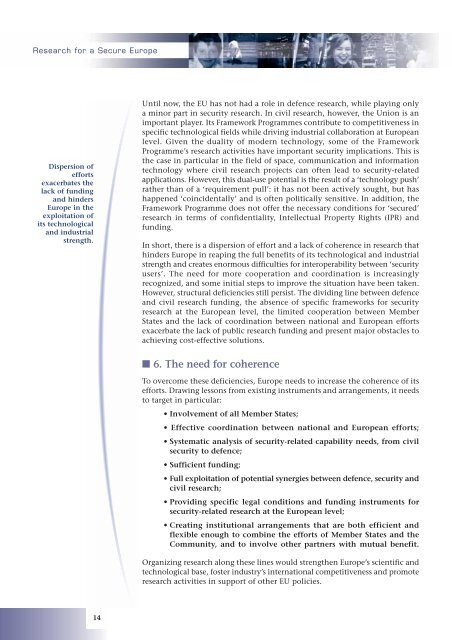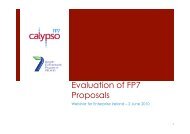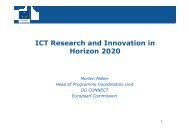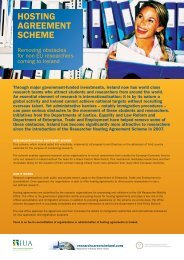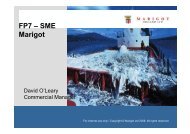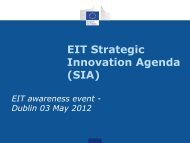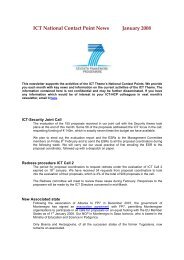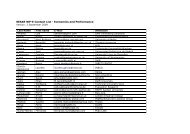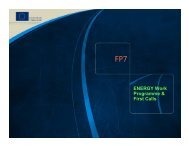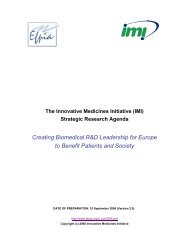Research for a Secure Europe - European Commission - Europa
Research for a Secure Europe - European Commission - Europa
Research for a Secure Europe - European Commission - Europa
You also want an ePaper? Increase the reach of your titles
YUMPU automatically turns print PDFs into web optimized ePapers that Google loves.
<strong>Research</strong> <strong>for</strong> a <strong>Secure</strong> <strong>Europe</strong><br />
Dispersion of<br />
ef<strong>for</strong>ts<br />
exacerbates the<br />
lack of funding<br />
and hinders<br />
<strong>Europe</strong> in the<br />
exploitation of<br />
its technological<br />
and industrial<br />
strength.<br />
Until now, the EU has not had a role in defence research, while playing only<br />
a minor part in security research. In civil research, however, the Union is an<br />
important player. Its Framework Programmes contribute to competitiveness in<br />
specific technological fields while driving industrial collaboration at <strong>Europe</strong>an<br />
level. Given the duality of modern technology, some of the Framework<br />
Programme’s research activities have important security implications. This is<br />
the case in particular in the field of space, communication and in<strong>for</strong>mation<br />
technology where civil research projects can often lead to security-related<br />
applications. However, this dual-use potential is the result of a ‘technology push’<br />
rather than of a ‘requirement pull’: it has not been actively sought, but has<br />
happened ‘coincidentally’ and is often politically sensitive. In addition, the<br />
Framework Programme does not offer the necessary conditions <strong>for</strong> ‘secured’<br />
research in terms of confidentiality, Intellectual Property Rights (IPR) and<br />
funding.<br />
In short, there is a dispersion of ef<strong>for</strong>t and a lack of coherence in research that<br />
hinders <strong>Europe</strong> in reaping the full benefits of its technological and industrial<br />
strength and creates enormous difficulties <strong>for</strong> interoperability between ‘security<br />
users’. The need <strong>for</strong> more cooperation and coordination is increasingly<br />
recognized, and some initial steps to improve the situation have been taken.<br />
However, structural deficiencies still persist. The dividing line between defence<br />
and civil research funding, the absence of specific frameworks <strong>for</strong> security<br />
research at the <strong>Europe</strong>an level, the limited cooperation between Member<br />
States and the lack of coordination between national and <strong>Europe</strong>an ef<strong>for</strong>ts<br />
exacerbate the lack of public research funding and present major obstacles to<br />
achieving cost-effective solutions.<br />
■ 6. The need <strong>for</strong> coherence<br />
To overcome these deficiencies, <strong>Europe</strong> needs to increase the coherence of its<br />
ef<strong>for</strong>ts. Drawing lessons from existing instruments and arrangements, it needs<br />
to target in particular:<br />
• Involvement of all Member States;<br />
• Effective coordination between national and <strong>Europe</strong>an ef<strong>for</strong>ts;<br />
• Systematic analysis of security-related capability needs, from civil<br />
security to defence;<br />
• Sufficient funding;<br />
• Full exploitation of potential synergies between defence, security and<br />
civil research;<br />
• Providing specific legal conditions and funding instruments <strong>for</strong><br />
security-related research at the <strong>Europe</strong>an level;<br />
• Creating institutional arrangements that are both efficient and<br />
flexible enough to combine the ef<strong>for</strong>ts of Member States and the<br />
Community, and to involve other partners with mutual benefit.<br />
Organizing research along these lines would strengthen <strong>Europe</strong>’s scientific and<br />
technological base, foster industry’s international competitiveness and promote<br />
research activities in support of other EU policies.<br />
14


